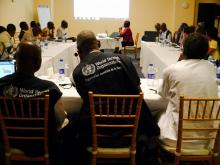WHO teams join forces to fight Ebola
In the final stages of an epidemic, it is more important than ever for all teams to come together and work on eradicating the virus. It has been a long year for WHO Guinea and for the Guinean people, as Ebola devastated the nation claiming 2387 lives. But as the response progressed, the teams at WHO Country Office continued to find innovative ways to work together. This month the entire Communications and Social Mobilization team and all of WHO’s Social Anthropologists in Guinea, came together to plan a strategy for collaboration.
As the number of cases reported drops and people remain vigilant about taking measures to reduce the risk of transmission, there is a chance to end the Ebola epidemic. Thus this initiative came from the recognition of the need for increased efforts and greater cohesion in this critical time of the response. The goal of the full-day workshop and plenary sessions was to strengthen the final stages of the Ebola response by increasing information-sharing and creating a synergy between the two teams.
“After having contributed to the recruitment of nearly 20 social anthropologists and almost 20 experts in communication and social mobilization, it seemed necessary to me to hold a technical meeting with all of those colleagues,” said Paryss Kouta, WHO Social Mobilization and Community Engagement Coordinator. “The objective was to define new strategic approaches and build a platform and synergy among WHO social anthropologists and communicators in Guinea. I am very happy that this innovative initiative has so far been a success.”
A meeting of minds
Those who attended the meeting provided a wealth of experience from communities in each of Guinea’s prefectures.
“This meeting will allow social anthropologists and communicators to improve the humanization of the response to this epidemic: either through the comfort of patients; through work with the population; or through the evolution of work and communication,” said Alain Epelboin, Anthropologist and WHO Ebola Consultant.
The meeting was divided into two sessions, beginning with separate workshops for each of the teams and concluding with a plenary session to compile the ideas and produce a strategy going forward. The initial workshops were very fruitful, with discussions around issues encountered in the field, concerns of communities throughout Guinea and strength and weaknesses of the WHO response. With round 20 participants in each workshop, the teams were able to produce key messages and work on creating strategies for working hand-in-hand.
Some of the community considerations which were raised throughout the day were: the issue of stigmatization for Ebola survivors; the importance of women in messaging and sensitization; and the importance of timely messaging to address fears and rumours in communities.
Working hand in hand to help communities
“It is important that we work in synergy with social anthropologist because it's the element which completes the response. The changes I hope to see through this synergy are changes in the behaviour of the community through knowledge of the disease, awareness and positive behaviour of the population,” said Mrs Tenin Traore, Communications Consultant in the Coyah prefecture.
The two teams will work to implement these strategies over the coming weeks and will continue to revise and improve the methods of collaboration. WHO envisage that this reciprocity will not only assist in the continuous improvement of processes and practices in the fight against Ebola, but also in future responses in Guinea.
_______________________________________________
For more information, please contact:
Pippa Haughton, Communications Officer WHO Guinea
Mobile: +224 624 980 069
Email: haughtonp [at] who.int




